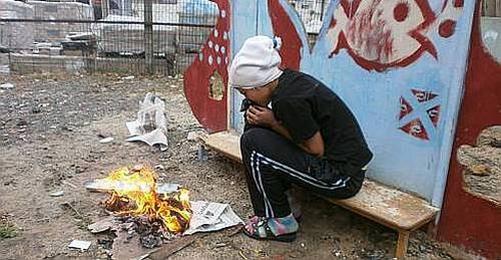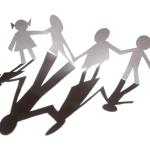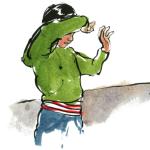CHILDREN'S SURVEY
Omnipresent Violence Pushes Children towards Crime

The Başak Culture and Arts Foundation in Istanbul and the Association for Children under one Roof (ÇAÇADER) in Diyarbakır, a Kurdish-majority city in south-eastern Turkey, carried out a survey with children and juveniles who were forced to immigrate to Istanbul or Diyarbakır.
The survey was part of the project "Am I guilty, are we guilty, are they guilty" addressing children and juveniles between14 and 18 years old. The results were announced on Tuesday (13 March).
In general, the answers to the questions were quite similar. However, once in while the replies were linked to the place of living.
Sociologist Ayşe Tepe Doğan evaluated the survey. According to Doğan, "it is possible to say that both the incidents encountered in daily life as well as frequently reported news in the media have an impact on the children's perspective on concepts of crime, violence, justice, right, equality etc."
Considering the answers obtained in both cities, Doğan emphasized that children are facing desperation from time to time.
The sociologist claims that violence is the most influential factor among several sources of violence. The children were asked how crime and violence could be prevented. They replied, "by means of equality, by providing justice and eliminating poverty, with peace, love, education, women's liberation, the free use of the mother language, awareness raising..." "Maybe, the children were telling the world of their dreams", Doğan interpreted their answers.
Differences between violent children
The survey aimed at revealing the children's views on the concept of crime and sources of crime and determined some differences in the approach of the children and juveniles in the two cities.
The most distinctive difference was the use of the concept of 'older children' by children in Diyarbakır. There, this group of 'older children' was resorting to violence the most often. Children and juveniles in Istanbul on the other hand did not use this sort of categorization at all.
In Diyarbakır, teachers were among the people who applied violence most frequently. In Istanbul, only one interviewee mentioned teachers.
Children in Istanbul often referred to "men" when they talked about who was applying violence. In Diyarbakır, only a very small number of survey participants gave similar answers.
Violent teachers, older children, adults...
The perception of violence of children in Diyarbakır includes beating, swearing, insult or fights. In the children's opinion, places where violence is used the most are schools, the streets and neighbourhood, home and police stations.
The persons applying violence in these places were described as teachers and older children at school, family members at home, children and adults in the street and police officers at police stations.
How is violence being encouraged?
The children and juveniles in Diyarbakır were asked what encouraged them to the use of violence. Most often they quoted reasons such as "exposure to verbal and physical violence, swearing, injustice or unjust treatment".
Asked to suggest solutions the children mentioned the following points: to be understood, to be heard, talking, strengthening communication and empathizing".
The children also defined inequality and injustice as reasons to resort to violence. In this context they spoke about "not meeting the most basic needs of people, not being able to provide a living for themselves and their families and a lack of interest and education shown and given by parents to their children". The children also mentioned a bad environment and bad company.
Solutions
Considering solutions, the children touched on issues like a humane life with equal rights and under equal conditions and benefiting from these rights in a just manner. They indicated that all people and families should have an income that enables them to make ends meet.
Violence against women in Istanbul
For the surveyed children in Istanbul, men take the lead of the group of people who apply violence. They also mentioned "fathers, the state, the police, the army, the political power, guards, oppressed people, bandits, people with power, criminals, vagrants, gangs, the mafia, thinner addicts, teachers, unjust people, families (mother/father), ignorant people, people, adults, young people, everyone, older children, unattended children, children, adults who are around, fans..."
One of the most significant outcomes of the survey is the fact that the children took notice of violence against women which was reflected in many answers.
Furthermore, important data was revealed regarding the question how to prevent crime and violence. The children and juveniles mentioned providing for justice and referred to the right and law. More strikingly, they also said, "in fact, there is no justice and equality" conceding that they did not believe in these concepts. (YY/VK)





